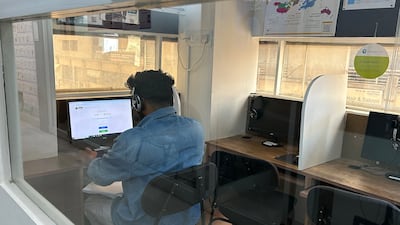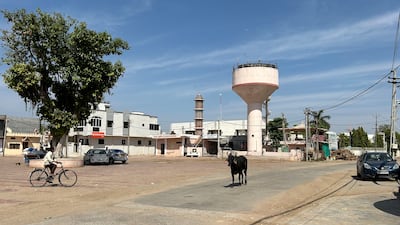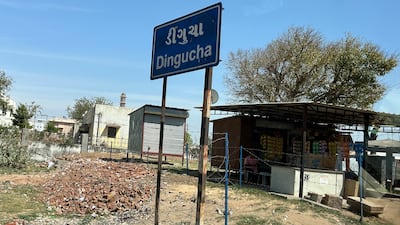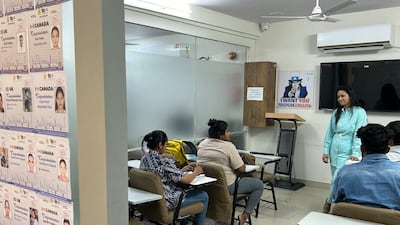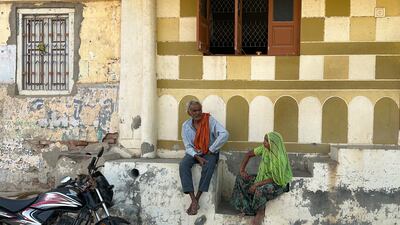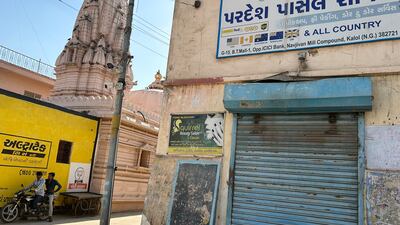On a sweltering afternoon in Nardipur village, in India’s western Gujarat state, a group of men sit in a public park discussing routes and different ways to migrate to Canada and the US.
Most of their relatives and friends are settled in the North American nations.
The men, between the ages of 22 to 37, are inspired by their lives and are determined to relocate – legally or illegally – to the countries at any cost.
“This is a trend. Everyone from Gujarat goes abroad. In my village, 3,500 people are living in foreign countries. If I don’t go, then I will be left behind,” Vishal Patel, 29, one of the men, told The National.
“We are all educated, so if it happens legally, then good; if there is no chance, then we will see what to do. The plan is to take citizenship in Canada and then move to the US,” he said, elaborating on his plan.
Gujarat, located next to the Arabian Sea, is one of the most prosperous states in India, but people have been emigrating for decades to the Middle East and North America.
American dream
However, this has come under the spotlight recently following cases of several people taking risky and illegal routes to attain the American dream.
Gujarat, the home state of Prime Minister Narendra Modi, has a strong entrepreneurial and business culture but, of late, it has had to deal with a brain drain.
Every year, thousands of people from the state migrate to western countries, with the US the most favoured.
As many as 1.5 million people of Gujarati origin live in the US, followed by the UK, Canada, and Australia, according to media reports.
The first wave of immigrants reached the US in the 1960s. They were mostly doctors and engineers, followed by another wave of migration comprising students and relatives of those already settled.
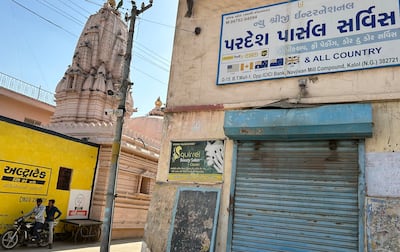
Most immigrants were Patels, who were a traditionally agrarian community but ventured into businesses and opened motels, further paving the way for their relatives and friends in a third wave.
Gujaratis own about 53,000 motels worth a combined $40 billion, or 42 per cent of the US hospitality market, according to the Asian American Hotel Owners Association.
However, new immigrants are diversifying their businesses by opening grocery stores and food chains, attracting the services of recently arrived immigrants, including those who entered the country illegally.
Greener pastures
While it helps businesses to employ cheap labour from India, for people back home, immigration provides an opportunity to live in the US and earn more, Raj Patel, 22, another villager from Nardipur, told The National.
He runs an ice cream parlour in his village and makes 15,000 rupees ($180) a month but says the money is not enough to make ends meet.
“I live with my mother and grandmother. My father died of Covid. How will we survive on 15,000 rupees? There is no stability,” he said.
According to government data, Gujarat’s unemployment rate stood at 1.7 per cent, compared to the national average of 3.1 per cent in 2023, a figure many critics dispute.
The state's 2021-2022 per capita income was 277,000 rupees ($3,300), according to the government, also higher than the national average of $2,393.
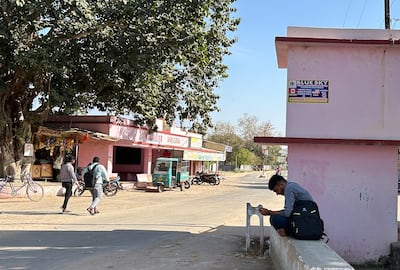
But Raj Patel, a graduate in the arts, said he was unable to find a well-paying job that encouraged him to migrate to Ontario in Canada, where his aunt runs a smoothie chain store.
“The main reason is to earn money. Here, we face struggles to get jobs and earn decent salaries. There is no guarantee that the business will survive next month. But our relatives and friends give us job security and dollars,” he said.
‘Donkey Route’
Barely 7km away from Nardipur is Dingucha, a prosperous area described as the “village of NRIs” (non-resident Indians) as more than 80 per cent of the families have settled abroad, a government official told The National.
In 2022, Jagdish Patel, 39, his wife Vaishali, 37, their daughter Vihangi, 11 and son Dharmik, 3, travelled to Toronto.
Days later, they were found dead in Manitoba, about 20km away from the border, as they attempted to enter the US illegally with the help of smugglers during a severe winter.
Last year, a chartered flight with 303 passengers headed to Nicaragua was stopped in France. French investigators later said the passengers, including 100 from Gujarat, aimed to make it to North American nations through illegal routes.
The incidents highlighted the scale of illegal immigration in the state.
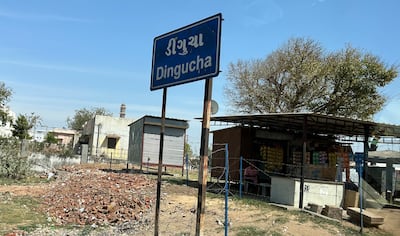
Many aspiring immigrants find it difficult to secure legal work permits in the US and Canada, owing to their poor educational and financial backgrounds, as well as their inability to speak English.
Many try to bypass the procedures and opt for riskier options such as the “donkey route”, where they trek through a chain of countries in South America to reach the US.
The well-oiled agents charge up to 8.5 million rupees for one person and up to 15 million rupees for a family of four, including plane tickets and transport up to the US border.
“I am going through an agent. I am just waiting for his call. I sent my cousin to Kentucky two years ago. Now he is arranging money for my family,” said Kismat Jansari, a father of one.
Mr Jansari, 37, is unfazed despite the incident at Manitoba and, instead, blamed the Patels for their desperation.
“It was not the agent’s fault; it was the family’s fault. It was too cold and yet they rushed to cross the border. We don’t think negatively,” he said.
“We are not bothered about getting caught. It is one life. If we fail, we will live here. But we will take one chance,” he said.
Cracking it young
The trend of moving abroad has caught up with the state’s young population who are lining up at local coaching centres to train for entry exams to study at foreign universities. Many hope this will help them sidestep immigration woes.
Varun Sharma, who runs the Foreign Education Club, a training and consultancy firm in Mehsana district, said they were witnessing an increase in the number of applicants joining their English language courses to secure admissions in foreign universities and settle abroad.
“More youngsters want to study, work and settle there. It is mainly because of freedom, exposure and more career opportunities,” Mr Sharma said.
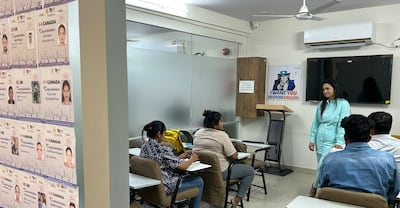
But he said that the desire to move abroad was so high that even younger students are willing to risk their lives by opting for illegal immigration.
“Out of 10, five students will ask us if we can send them [illegally]. It could be because of money or time as the proper process takes two to three months to clear exams and get university admission but agents promise them one month,” he said.
However, many are cautious after the death of the Patel family.
“I know many people in our village who have taken the donkey route, but it is too risky.”
“I would rather study and then start a business legally,” said Dilip Kumar Chaudhary, 24, who is preparing for a study visa in Canada.


